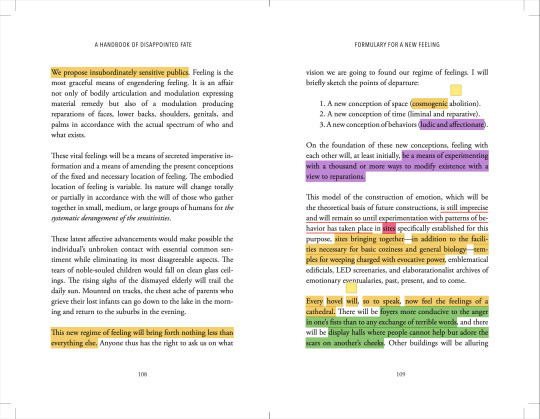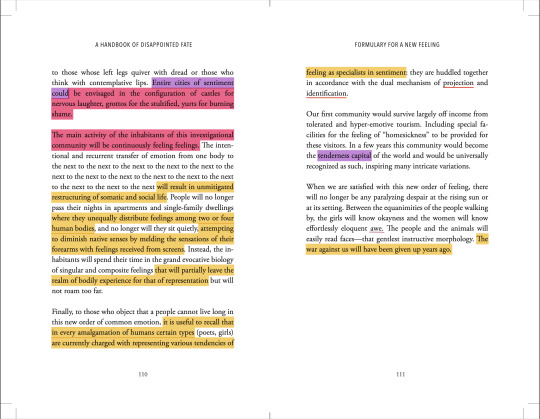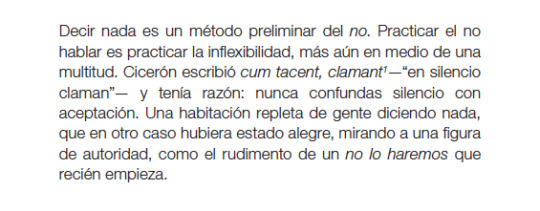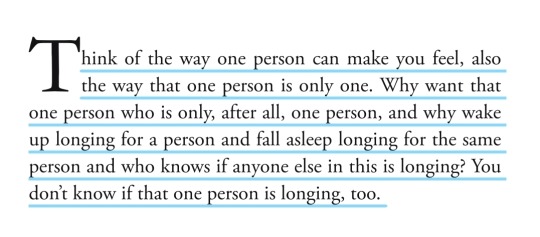#a handbook of disappointed fate
Explore tagged Tumblr posts
Text
Callar es un momento preliminar del no. Practicar el no hablar es practicar la inflexibilidad, más aún en una multitud. Cicerón escribió cum tacent, clamant –«al callar, gritan»– y tenía razón: nunca confundan el silencio con aceptación. Una habitación repleta de gente callada, que en otro caso hubiera estado alegre, mientras mira a una figura de autoridad, es silencio como sedimento de un no que recién empieza.
—Anne Boyer, «No» en Manual para un destino desencantado. Traducción de Rodrigo Olavarría y Adalber Salas Hernández.
#anne boyer#manual para un destino desencantado#a handbook of disappointed fate#rodrigo olavarría#adalber salas hernández
32 notes
·
View notes
Text
Sometimes our refusal is in our staying put. We perfect the loiter before we perfect the hustle.
Anne Boyer, "No", in A Handbook of Disappointed Fate
3 notes
·
View notes
Text


I love this so much, Anne Boyer on a "formulary for a new feeling" that will be tied to sites for "continuously feeling feelings". Aah, I really want to work about cities. Boyer here speaks about "cities of sentiment", the "tenderness capital of the world". So that, once these cities are standing, "[t]he war against us will have been given up years ago".
#Anne Boyer#The Handbook of Disappointed Fate#feelings#sentiments#city#cities#site#poetry#tenderness
5 notes
·
View notes
Text


"toward a provisional avant-garde" from a handbook of disappointed fate, anne boyer
187 notes
·
View notes
Note
What are a few of your favorite books? / writers
handbook of disappointed fate by anne boyer is something that’s absolutely worth reading, she is one of my favorites
any sophie calle book
i’m a big toni morrison fan
i love chris kraus too oops i love dick changed my life
play as it lays is my fav didion
i mainly read a lot of art/philosophy related texts i can maybe link them directly if that’s of interest idk
28 notes
·
View notes
Text
Azalin reviews: Darklord Bluebeard

Domain: Blaustein Domain Formation: 643 BC Power Level: 💀 ⚫⚫⚫⚫ (1/5 skulls) Sources: Domains of Dread (2e), Darklords (2e), Ravenloft Player’s Handbook (3e), VRGTR (5e)
Bluebeard is the Darklord of Blaustein within the Sea of Sorrows. His tiny island is made up of his castle (creatively named “Bluebeard’s Castle”) and a single village.
Bluebeard was an ugly yet charming man with enough wealth to offset his repugnant features. Nowadays, I don’t believe his blue facial hair would really amount to such disdain, but one never knows. Though even if his beard was a more “natural” color, it is his personality, or lack thereof, that most truly distain.
Bluebeard is from an unknown land and who’s distrust and pettiness lead him to kill every single woman who agreed to marry him. Why did they keep on agreeing to marry someone who’s wives continually died or went missing? Well, he was said to be a kind and just ruler, which led many to overlook his otherwise glaring faults. How could such a seemingly benevolent lord murder all of his wives? I imagine that’s what his people asked one another as they heard screams echoing down from his castle…
Bluebeard would marry a young woman and expect absolute loyalty and obedience from them. Trust me, regardless of how powerful you may be, this is not a realistic expectation to have in one’s spouse. To test their obedience, after a month of marriage, Bluebeard would go on a trip and give his wife a number of keys that opened various doors in the castle. He told them they could go anywhere they wished, except a small room on the top floor of a tower. This room was locked with a golden key and he forbade his wife to go within.
Each woman he married let their curiosity win over their obedience and used the golden key to enter the room. What they found within was a room stained in blood and the dead bodies of Bluebeard’s previous wives suspended on hooks hanging from the ceiling. Though, I suppose his first wife just found an empty room. That must have been very disappointing, though preferable over what the other wives found. The golden key, when used to open the door to this room, became stained with blood. No one but Bluebeard could remove the stain.
Upon returning from his trip, Bluebeard would demand the keys from his wife and upon seeing the blood stain on the golden key, he would feign disappointment, kill his bride, and hang her in the room with the rest of his dead wives. After eight or so wives, Bluebeard was claimed by the Mists.
Our tormentors were so kind to gift him with some of the most ridiculous boons. He is no longer exceedingly physically ugly, he can erase his misdeeds from the memories of his subjects, and every single one of those subjects, including his dead wives, are fanatically loyal to him. Now, this ability of his to change their minds only works on those native to Blaustien, so it is no where near my own abilities and something I managed to achieve on my own. Oh and he’s a living lie detector. Handy. I’d like to have him interview a certain vampire someday.
At night, his wives freely roam his castle as spectres and show their husband their devotion, but he rebuffs them, disgusted with their undead forms. Now whenever Bluebeard courts a woman from Blaustien, they take on the appearance of one of his wives in their undead form, a smirk always upon their face. No one else sees this and it seems to only affect women native to Blaustien...which, naturally, leads Bluebeard to seek out wives in other realms, though their fate is always the same. A golden key, a room of dead brides, and another murder.
In Van Richten’s new guide, Blaustien is no longer considered its own Domain and Bluebeard’s wives have overthrown him and entertain him with endless torment. Perhaps the Dark Powers decided the woman had suffered enough at his hands and it was now his turn to endure a true punishment? I would venture that none of his boons exist any longer. Perhaps they have transferred to his countless wives.
Despite all of the boons the Dark Powers once granted him, Bluebeard was always just a petty, distrustful, mortal man. A mere insect to be swatted away and a Darklord who cannot even control the Misty borders that surround his so-called Domain. I am reluctant to give him a single skull.
#bluebeard#ravenloft#darklordreviews#azalin rex#dnd#blaustein#clearly this is taken directly from the French folktale of the same name
19 notes
·
View notes
Text
GETTING MY FIRST JOB
The overwhelming excitement I am feeling right now is beyond words. It is a testament to the hard work I have invested and the unwavering support from my friends and family that has led me to this incredible opportunity. Although my new job as a mediator at Science Gallery Bengaluru may not directly align with my field of study, I have a strong intuition that this experience will be immensely enriching.
Discovering this internship was a stroke of luck, thanks to my friend's sibling who pointed me in the right direction. Initially, I applied in February, filled with hope, only to receive the disappointing news that I had not made it past the first round. Nonetheless, I celebrated my friend's success as she advanced to the interview stage. Little did I know that fate had something else in store for me.
In May, my friend informed me about another round of applications. Initially hesitant, I heeded my mother's advice and decided to give it another shot. With the help of my friend and her sister, my lackluster CV was transformed into a masterpiece. I am forever grateful for their talent and dedication, as my CV went from a 0 to a perfect 10.
Carefully answering the application questions, I sought guidance from my friend, who had successfully made it through. Even at the late hours of the night, she selflessly replied to my messages, and for that, I am deeply thankful. After meticulously reviewing, rechecking, and revising my application, I finally submitted it, hoping for the best.
A week later, the news arrived—I had been selected for an interview. Ecstatic doesn't even begin to describe the joy that consumed me. However, the interview coincided with my exams, leaving me with little time to prepare. I immersed myself in the handbook and watched two one-hour videos, dedicating an entire day to crafting my presentation. Despite my efforts, the interview itself turned out to be a disaster, leaving me disheartened and discouraged.
I decided to divert my focus towards my exams and temporarily forget about the outcome of the interview. It was during the celebrations of completing my first year, in a moment of pure impulse, that I checked my email, expecting a rejection letter. But to my astonishment, the email I received informed me that I had been selected! I was overwhelmed with happiness, unable to contain my smile.
Now, nearly 20 days later, I find myself holding the contract of my employment, which I eagerly signed. Throughout this journey, many individuals questioned the number of internships I was pursuing and wondered why I hadn't secured a job yet. I am proud that I did not allow these comments to affect me or my determination to succeed.
This blog post serves as a message to my future self, a reminder of my first major achievement as an 18-year-old. I want to remember the excitement, the persistence, and the belief in myself that propelled me forward. This is just the beginning, and I am excited to embark on this new chapter of growth and learning.
2 notes
·
View notes
Note
u mentioned favorite authors in a post somewhere. any contemporary faves from this year? 💖💖
there were some lovely releases this year! Kaveh Akbar’s Martyr! changed my brain. I’m a Marie Howe fanatic, so I also really enjoyed her New and Selected. I loved Norma Jeane Baker of Troy, so Carson’s February release Wrong Norma was a really clever callback.
Other contemporaries who I love but have not published this year are Guadalupe Nettel (Bezoar was fantastic), Eduardo Corral (Guillotine!!!!!! Just stunning), Sara Uribe (Antígona González, for me, rivaled Carson’s Antigonick. Feels blasphemous to say but it’s just that good), Anne Boyer (A Handbook of Disappointed Fate, specifically her essay “The Same, All-Coordinating Light”), and Dionne Brand is always a favorite.
1 note
·
View note
Text
Books ruined my life, and I love them. I love the ecstatic absorption that comes with reading, the self-annihilative surrender to the dead or far away, the luring and the transporting and the cathecting,
Anne Boyer - 'A Handbook of Disappointed Fate; Take Up and Read.'
1 note
·
View note
Text

Anne Boyer, Manual para destinos defraudados. Traducción de Adalber Salas Hernández.
#anne boyer#manual para destinos defraudados#a handbook of disappointed fate#adalber salas hernández
13 notes
·
View notes
Quote
Books ruined my life, and I love them. I love the ecstatic absorption that comes with reading, the self-annihilative surrender to the dead or far away, the luring and the transporting and the cathecting,
Anne Boyer, from A Handbook of Disappointed Fate; Take Up and Read.
361 notes
·
View notes
Text

A Handbook of Disappointed Fate: Erotology, by Anne Boyer
#quotes#literature#reading#currently reading#read#books#books and literature#excerpts#lit#quote#anne boyer#a handbook of disappointed fate#erotology#love#longing
45 notes
·
View notes
Quote
Some days my only certain we is this certain we that didn’t, that wouldn’t, whose bodies or spirits wouldn’t go along. That we slowed, stood around, blocked the way, kept a stone face when the others were complicit and smiling.
Anne Boyer, A Handbook of Disappointed Fate
12 notes
·
View notes
Text





Anne Boyer
197 notes
·
View notes
Text
Anne Boyer, “No,” from A Handbook of Disappointed Fate
History is full of people who just didn’t. They said no thank you, turned away, escaped to the desert, lived in barrels, burned down their own houses, killed their rapists, pushed away dinner, meditated into the light. Even babies refuse, and the elderly also. Animals refuse: at the zoo they gaze through Plexiglas, fling feces at human faces. Classes refuse. The poor throw their lives onto barricades, and workers slow the line. Enslaved people have always refused, poisoning the feasts and aborting the embryos, and the diligent, flamboyant jaywalkers assert themselves against traffic as the first and foremost visible daily lesson in just not.
Saying nothing is a preliminary method of no. To practice unspeaking is to practice being unbending, more so in a crowd. Cicero wrote cum tacent, clamant —“in silence they clamor”—and he was right: never mistake silence for agreement. Silence is as often conspiracy as it is consent. A room of otherwise lively people saying nothing, staring at a figure of authority, is silence as the inchoate of a now-initiated we won’t.
Sometimes our refusal is in our staying put. We perfect the loiter before we perfect the hustle. Like every toddler, each of us once let all adult commotion move around our small bodies as we inspected clover or floor tile. As teens we loitered, too, required Security to dislodge us, like how once in a country full of freely roaming dogs, I saw the primary occupation of the police was to try to keep the dogs out of the public fountains, and as the cops had moved the dogs from the fountains, a new group of dogs had moved in. This was just like being a teenager at the mall.
Some days my only certain we is this certain we that didn’t, that wouldn’t, whose bodies or spirits wouldn’t go along. That we slowed, stood around, blocked the way, kept a stone face when the others were complicit and smiling. And still we ghost, and no-show, and in the enigma of refusal, we find that we endogenously produce our own incapacity to even try, grow sick and depressed and motionless under all the merciless and circulatory conditions of all the capitalist yes and just can’t, even if we thought we really wanted to. This is as if a river, who saw the scale of the levees, decided that rather than try to exceed them, it would outwit them by drying up.
While it is true that refusal is a partner to death—I think it was Mary McCarthy who said even a gun to the head is merely an invitation—death is also a partner to refusal, as in often not the best option, but an option nonetheless. Death as refusal requires as its material only life, which if rendered cheap enough by the conditions that inspire the refusal, can become precious again when selectively and heroically deployed as a no.
Poetry is sometimes a no. Its relative silence is the negative’s underhanded form of singing. Its flights into a wide-ranged interior are, in the world of fervid external motion, sometimes a method of standing still. Poetry is semi-popular with teenagers and revolutionaries and good at going against, saying whatever is the opposite of something else, providing nonsense for sense and sense despite the world’s alarming nonsense. Of all the poems of no, Venezuelan poet Miguel James’s Against the Police, as translated by Guillermo Parra, refuses the most elegantly:
AGAINST THE POLICE My entire Oeuvre is against the police If I write a Love poem it’s against the police And if I sing the nakedness of bodies I sing against the police And if I make this Earth a metaphor I make a metaphor against the police If I speak wildly in my poems I speak against the police And if I manage to create a poem it’s against the police I haven’t written a single word, a verse, a stanza that isn’t against the police All my prose is against the police My entire Oeuvre Including this poem My whole Oeuvre Is against the police
Poets have famously enstatuated themselves among hermits and saints as an expert-class of refusers. Emily Dickinson, Gwendolyn Brooks, George Oppen, Amiri Baraka stand in that pantheon of “not this,” those who sometimes wore their laurels like a crown of thorns. The pantheon of those who won’t is the best church poetry has to offer. It’s a temple perfumed with the incense of sacrificed literary reputation, littered with bankruptcy notices for cynical cultural capital, warmed by the greater fire of the intrinsic, populated by the most famous and the most anon. In it, you will find no poetry in the shape of a cowardly maybe, or fluorescent yes, or cloying, collaborating, reactionary, status-loving, and desperately eager whatever-they-say-I’ll-do.
I like no. It’s sidewise to a reverse mantra (om). It’s stealthy, portable, and unslouching. It presides over the logic of my art, and even when it is uttered erringly there is something admirable in its articulation. But even the greatest refusalists of the poets might be somewhat ironic deployers of that refusal, for what is refused often amplifies what is not. The no of a poet is so often a yes in the carapace of no. The no of a poet is sometimes but rarely a no to a poem itself, but more usually a no to all dismal aggregations and landscapes outside of the poem. It’s a no to chemical banalities and wars, a no to employment and legalisms, a no to the wretched arrangements of history and the greed-laminated earth.
Sometimes poetry enacts its refusal in its formal strategies, and of these formal strategies of refusal, among the simplest is the poetic technique called “turning the world upside down.” This Walt Whitman poem, called “Transpositions,” depends upon reversal as enacted refusal:
Let the reformers descend from the stands where they are forever bawling—let an idiot or insane person appear on each of the stands; Let the judges and criminals be transposed—let the prison keepers be put in prison—let those that were prisoners take the keys; Let them that distrust birth and death lead the rest.
“Transpositions” inverts social classes so that the structure which enforces the existence of those social classes is exposed as unworkable. Whitman’s poem is generous and ongoing in that anyone reading this could practice the same mode of refusal, write some transpositions, too. Here’s how: take what is, and turn it upside down. Or take what is and make it what isn’t. Or take what isn’t and make it what is. Or take what is and shake it until change falls out of its pockets. Or take any hierarchy and plug the constituents of its bottom into the categories of its top. Or take any number of hierarchies and mix up their parts.
In Bertolt Brecht’s 1935 essay, “Writing the Truth: The Five Difficulties,” there’s a fragment of an ancient Egyptian poem of reversal:
So it is: the nobles lament and the servants rejoice. Every city says: Let us drive the strong from out of our midst. The offices are broken open and the documents removed. The slaves are becoming masters.
So it is: the son of a well-born man can no longer be recognized. The mistress’s child becomes her slave girl’s son.
So it is: The burghers have been bound to the millstones. Those who never saw the day have gone out into the light.
So it is: The ebony poor boxes are being broken up; the noble sesban wood is cut up into beds. Behold, the capital city has collapsed in an hour. Behold, the poor of the land have become rich.
Brecht writes about the poem, “It is significant that this is the description of a kind of disorder that must seem very desirable to the oppressed. And yet the poet’s intention is not transparent.” Through reversal, the poem spares itself from the political perils of a direct call for upending the world while through imagining it, makes the impossible slightly less so. Now that the unfamiliar order has been given a cognitive rehearsal in the safety of a poem, it doesn’t seem quite as unlikely that the capital city could collapse in an hour or the poor of the land could become rich. But more than a cognitive rehearsal, that city’s collapse also gets a social one: it has not only been staged in one person’s mind, it has also been shared, and in its sharing, the desires of the poem step—as the fulfillment of these desires require their own social requirement of collective effort—toward an enactment.
Refusal, which is only sometimes a kind of poetry, does not have to be limited to poetry, and turning the world upside down, which is often a kind of poetry, doesn’t have to be limited to words. Words are useful for upending the world in that they are cheap, ordinary, portable, and generous, and they don’t mess us up too badly if we use them wrong, not like matches or machetes, but poetry is made up of ideas and figurations and tropes and syntaxes as much as it is made up of words. We can make a poetry without language because language as the rehearsal material of poetry has made the way for another poetry, that of objects, actions, environments and their arrangement. This is not saying to be a poet means you can only rehearse turning over the world: now try putting the chair on your head.
Transpositions and upendings, at least for a minute, refuse and then reorder the world. So, too, poetry manages a transposition of vocabulary: a refusalist poet’s “against” is an agile and capacious “for,” expanding the negative to genius and the opposite of to unforeseen collapses and inclusions. These words mean something else, or as the British poet Sean Bonney writes:
Our word for Satan is not their word for Satan. Our word for Evil is not their word for Evil. Our word for Death is not their word for Death.
There is a lot of room for a meaning inside a “no” spoken in the tremendous logic of a refused order of the world. Poetry’s no can protect a potential yes—or more precisely, poetry’s no is the one that can protect the hell yeah, or every hell yeah’s variations. In this way, every poem against the police is also and always a guardian of love for the world.
#anne boyer#cicero#miguel james#walt whitman#bertolt brecht#sean bonney#a handbook of disappointed fate
74 notes
·
View notes
Quote
The object of love is not an object at all, and what you've mistaken a person for an object is what's wrong with love's distortions. To feel the wretched pain of a love after a love has long ended is not just to feel the pain at losing love but to feel pain at the way love turns a person into a possession that can be lost
“Erotology II: The Long Night” A Handbook Of Disappointed Fate- Anne Boyer
3 notes
·
View notes